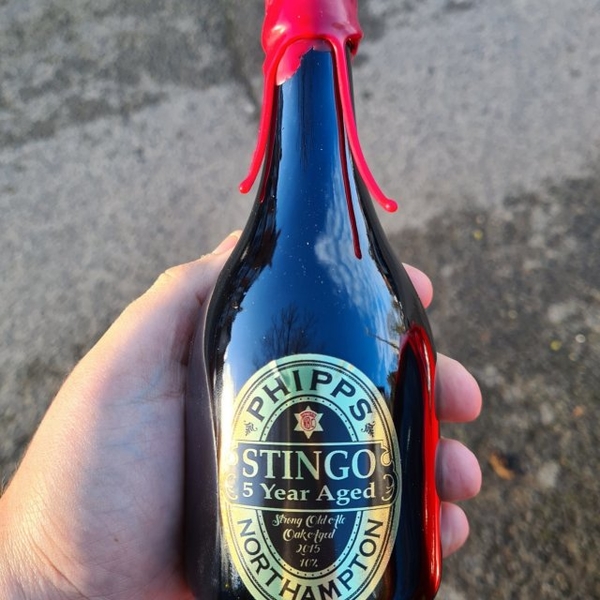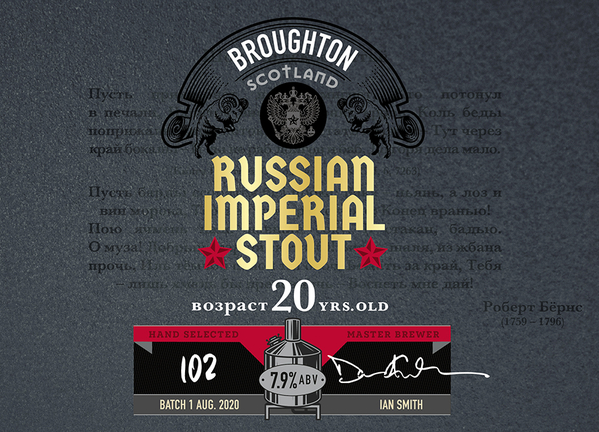Two beers shine a light on brewing's past
Added: Wednesday, December 16th 2020

Two beers that have been brought back from the past turn the spotlight on the fascinating history of brewing in Britain. In Northampton, Phipps has aged a strong ale called Stingo for five years in wooden casks while Broughton Brewery in the Scottish Borders is selling a limited number of bottles of an Imperial Russian Stout that’s 20 years old.
The 10 per cent Phipps’ beer comes from the restored Albion Brewery site in Northampton that was once part of Phipps NBC, a large brewing company based on Bridge Street whose site is now the Carlsberg lager factory. Phipps and the Northampton Brewery Company (NBC) merged in 1957 by simply knocking down the wall between the two plants. They were based cheek by jowl to take advantage of the fine brewing water in the area.
They had both brewed beers called Stingo and they became Stingo No 10 following the merger. The term is thought to have originated in Yorkshire – Sam Smith’s still makes it own version – and it’s believed the name comes from the fact that the barley wines had a powerful alcoholic sting.
Phipps NBC had the misfortune to be taken over by the giant London brewery Watney Mann in 1960, which phased out all the local beers in favour of the infamous Red Barrel keg beer. It closed the site in 1974 and sold it to Carlsberg.
The nearby Albion Brewery, dating from 1840, had been owned by Phipps. Alaric Neville re-opened it in 2008 with a 15-barrel plant and he has restored many of the old Phipps’ beers, including Stingo. The brewery has deep conditioning cellars and in 2019 he decided to store a batch of the annual Stingo in oak casks and keep them for a special occasion. A year later, he considered the lockdown and its hardships would be the ideal time to launch the beer and put a smile on drinkers’ faces.
He says drinkers in Northamptonshire used to call for a drink they called Sunshine and Rain. They would order a pint of Phipps’ IPA, drink some of it and then top up the glass with a shot of Stingo. His version, bottle conditioned, is brewed with low colour Maris Otter malt, brown and enzymic malts, with brewing sugar and treacle. The hops are First Gold, Fuggles and Goldings. The finished beer is aged in whisky casks from Islay with some from the White Rose cooperage in Yorkshire.
The deep copper/red beer has a massive hit of Cognac-like fruit on the nose with ripe malt, oak and vanilla. The palate has a rich malt base but with notes of vanilla, butterscotch, oak and a gentle hint of hops. The finish is bittersweet with malt and vanilla to the fore but the beer finally ends dry and fruity. www.phipps-nbc.co.uk.

Broughton Brewery is in the small town of the same name, once home to John Buchan of The 39 Steps fame. In 2000 it brewed a batch of Russian Imperial Stout for a customer in St Petersburg who ran out of money and the beer was never delivered. As a result, the oak casks were left in the barrel store for 20 years.
The style of beer was first brewed in London in the 18th and 19th centuries by such major breweries as Barclay Perkins. It was the hey-day of the demand for porter and stout and strong versions were brewed for export to Russia and the Baltic States. The beer was so popular at the Russian court that Catherine the Great granted the importer, a Belgian named Albert Le Coq, a royal warrant. As a result, the British brewers were able to call their export porters and stouts “Imperial”.
To avoid tariffs on imports, Le Coq’s company built a brewery in Tartu and produced the beer there. But in 1917, when the Bolsheviks came to power, Lenin was unimpressed with a beer called imperial and said production should stop. The Tartu brewery switched to making lager while back in Britain the style virtually disappeared, save for small batches occasionally made by the Courage brewery close to Tower Bridge.
Courage closed in 1981 but today a number of breweries have picked up the mantle and are brewing their interpretations of imperial stout. The Broughton version (7.9 per cent) is brewed with pale, roast, crystal and chocolate malts with oats. The hops are First Gold, Fuggles and Perle. It's jet black with a thick collar of barley white foam. Roasted grain, espresso coffee, bitter chocolate, vanilla, oak and dark fruits command the aroma, while bitter chocolate and coffee lead on the palate with big contributions from roasted grains and dark fruit. There’s creamy malt on the finish but that is balanced by vanilla, oak, raisin and sultana fruit and a gentle hint of hops.
There’s strictly limited availability and customers have to buy two 330ml bottles for £50. This is part of a crowd funding campaign to raise urgent cash for the brewery and keep it open as a result of the problems caused by the pandemic. www.broughtonales.co.uk.








